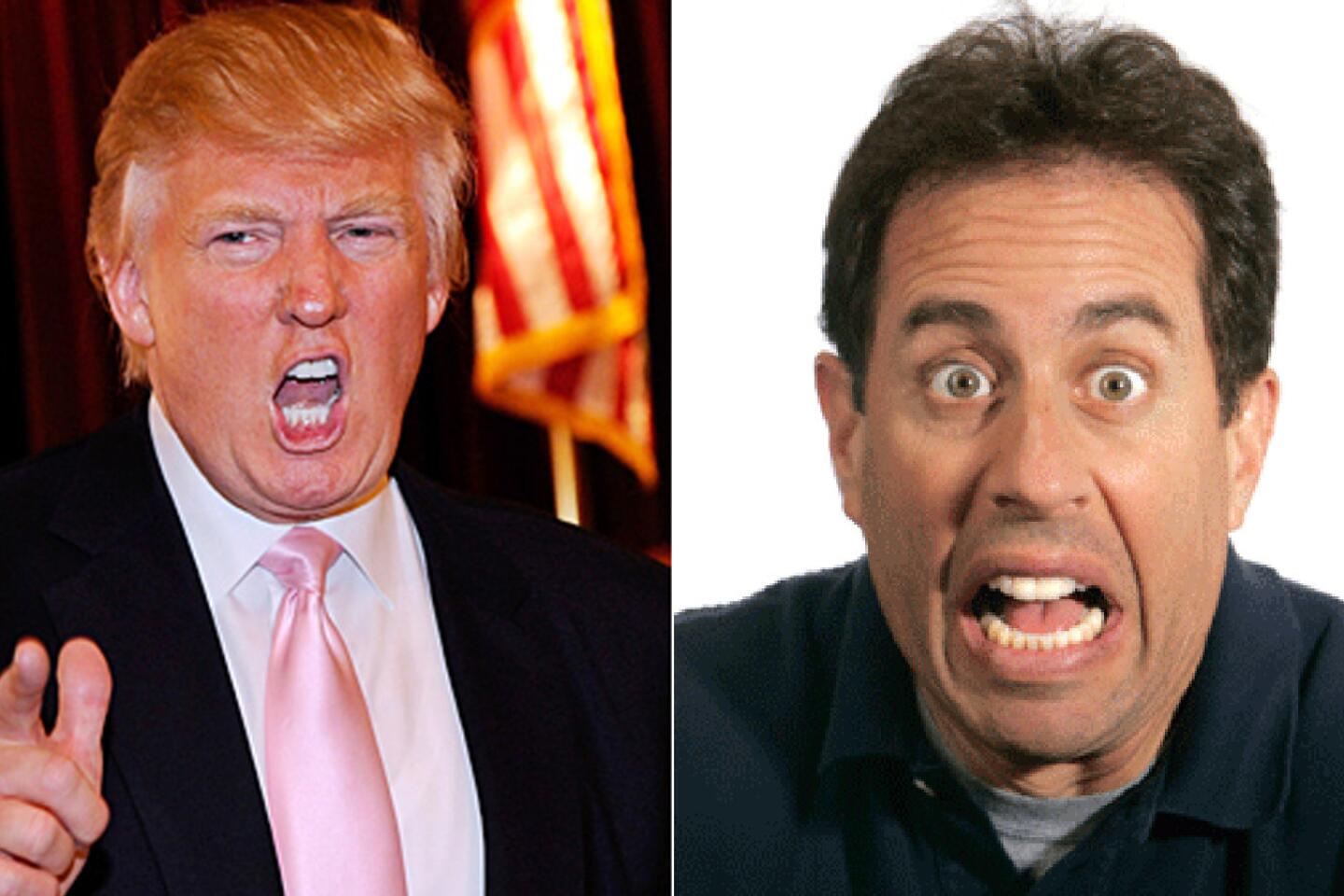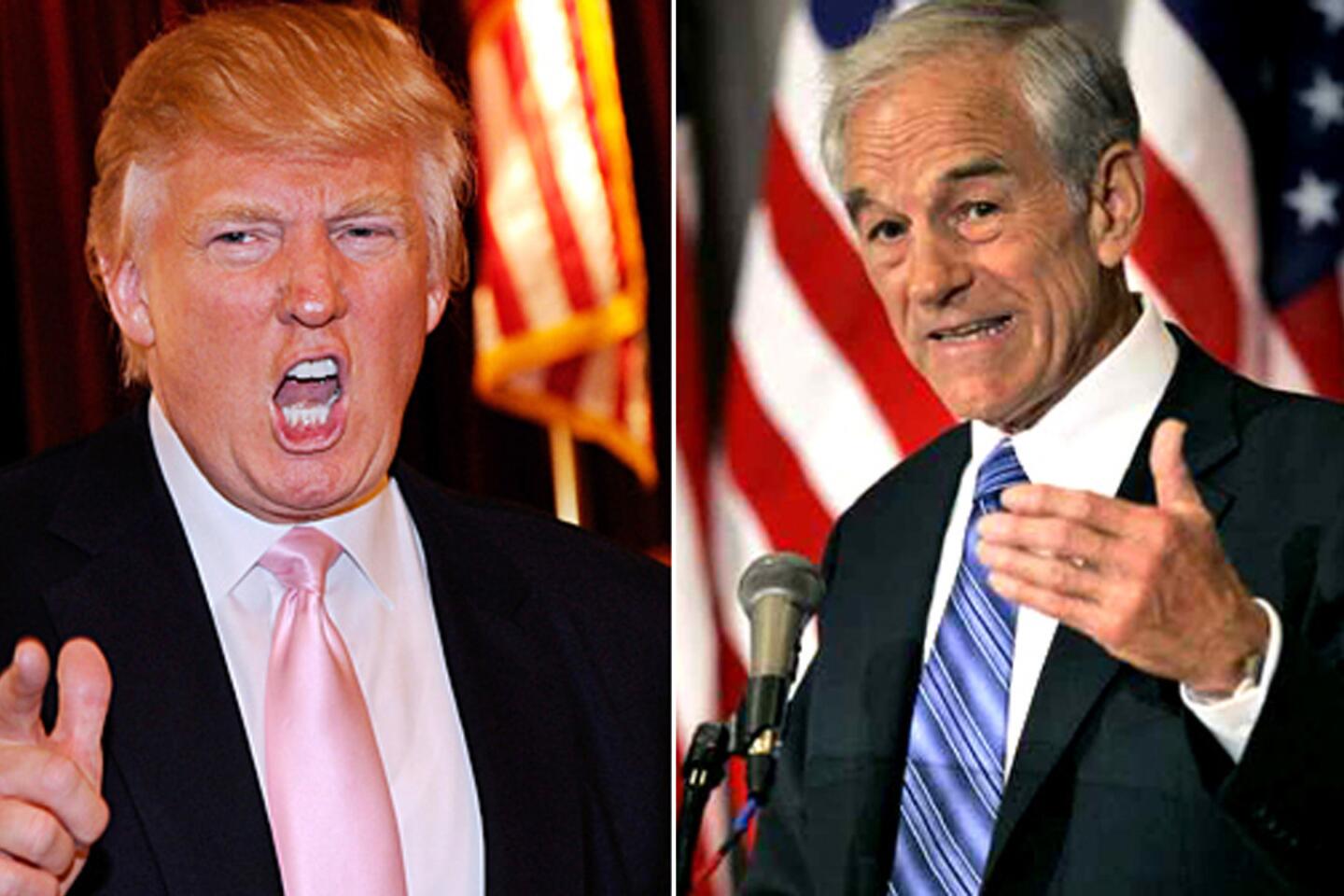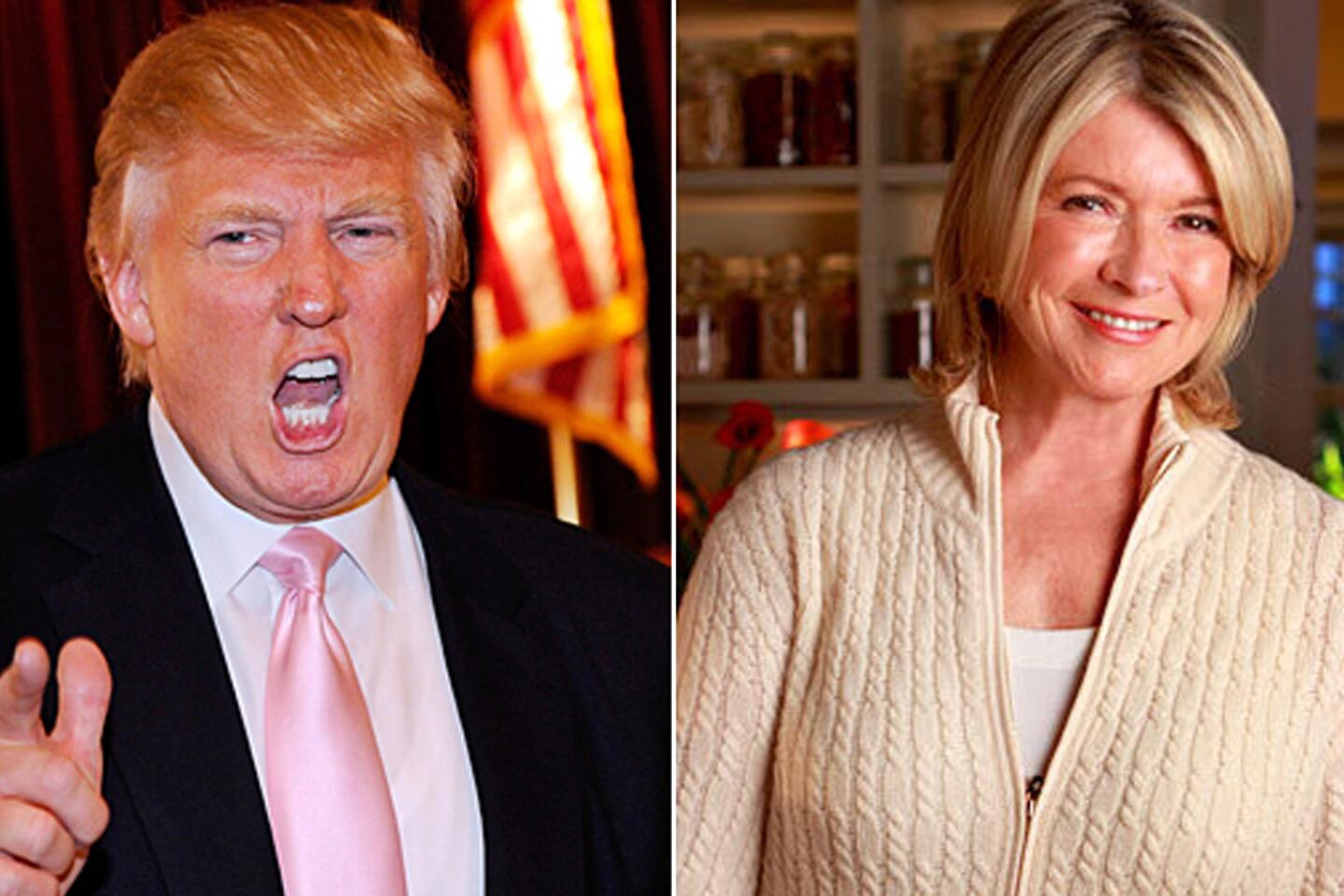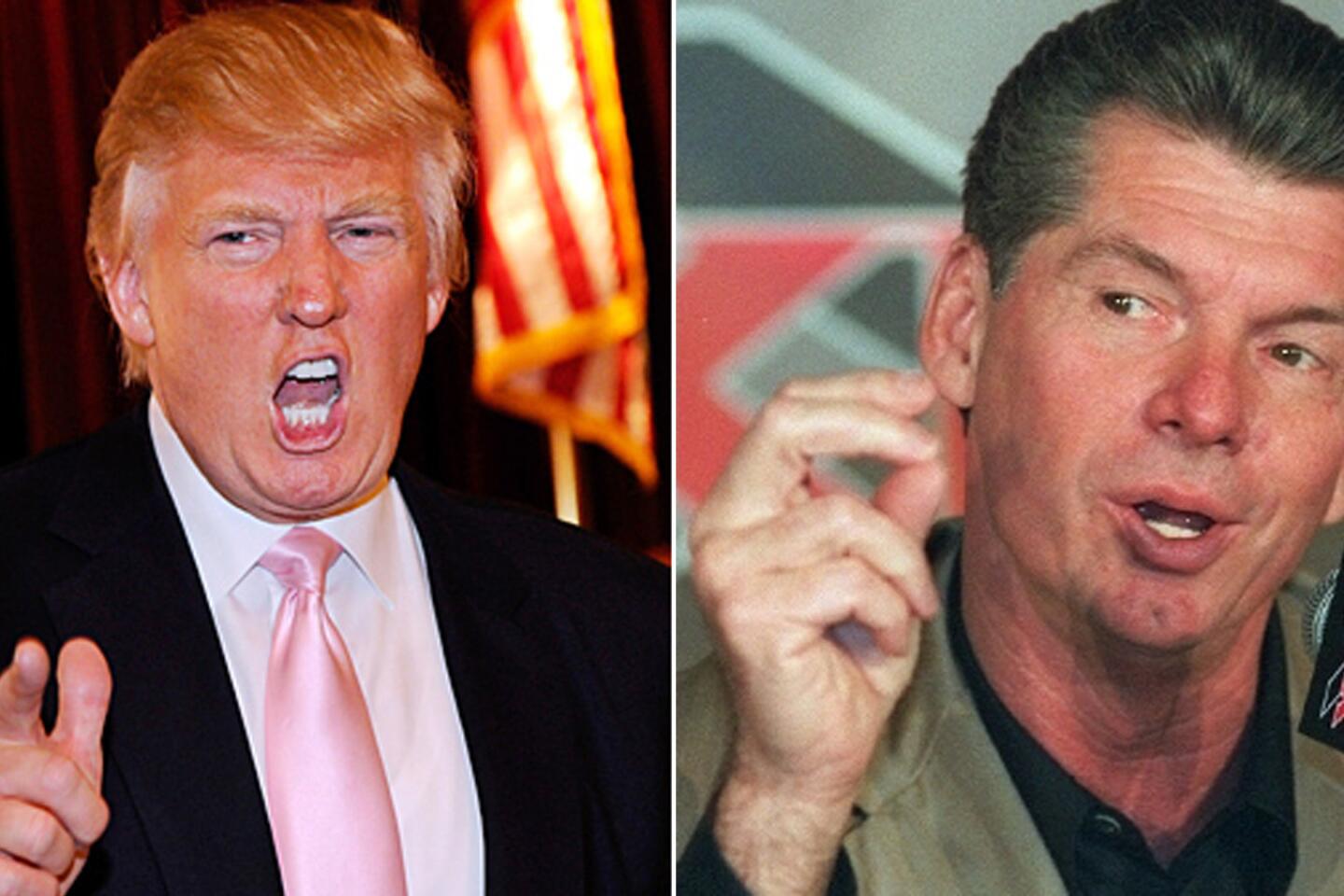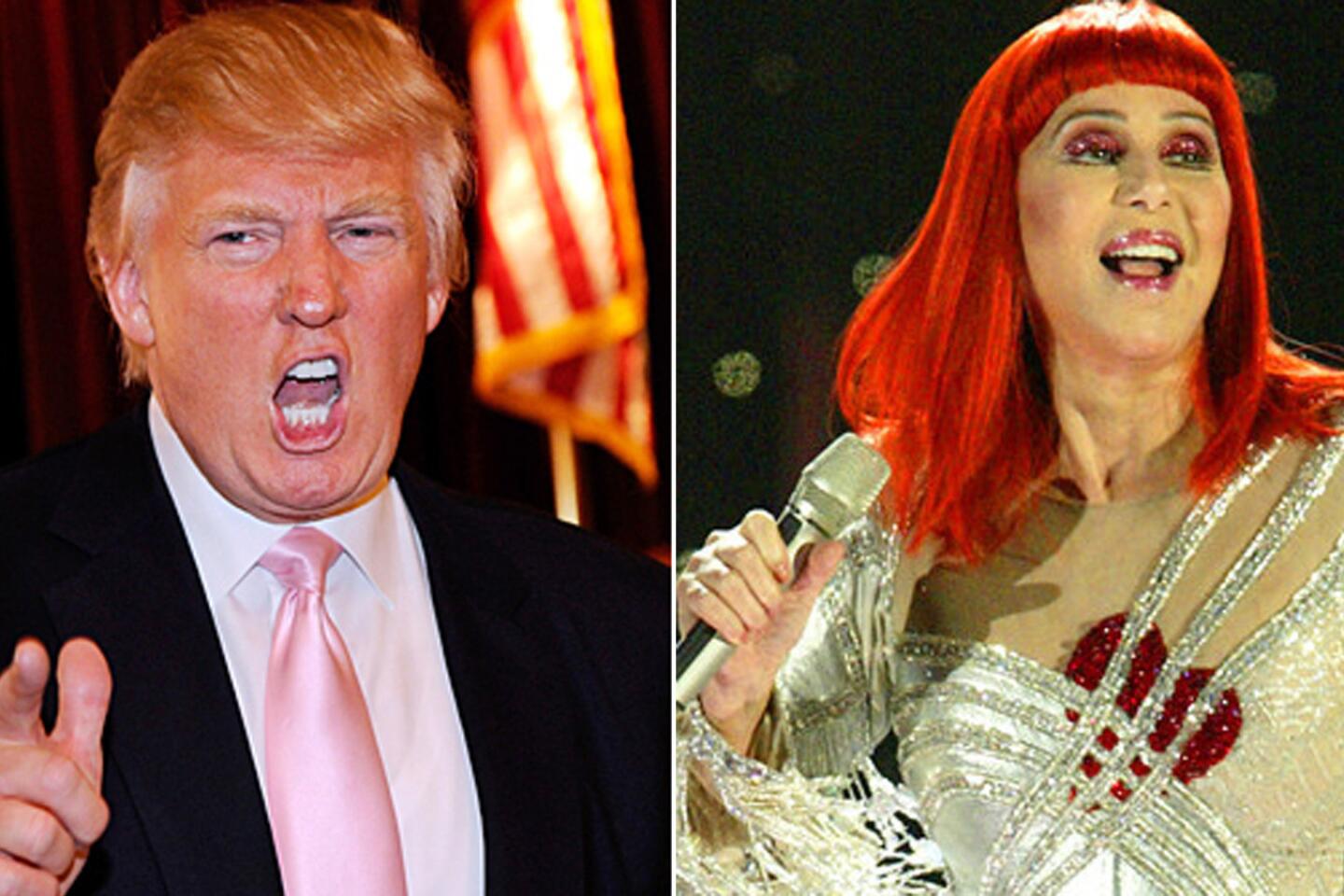Critic’s Notebook: Why huge ‘SNL’ ratings won’t help Donald Trump become president
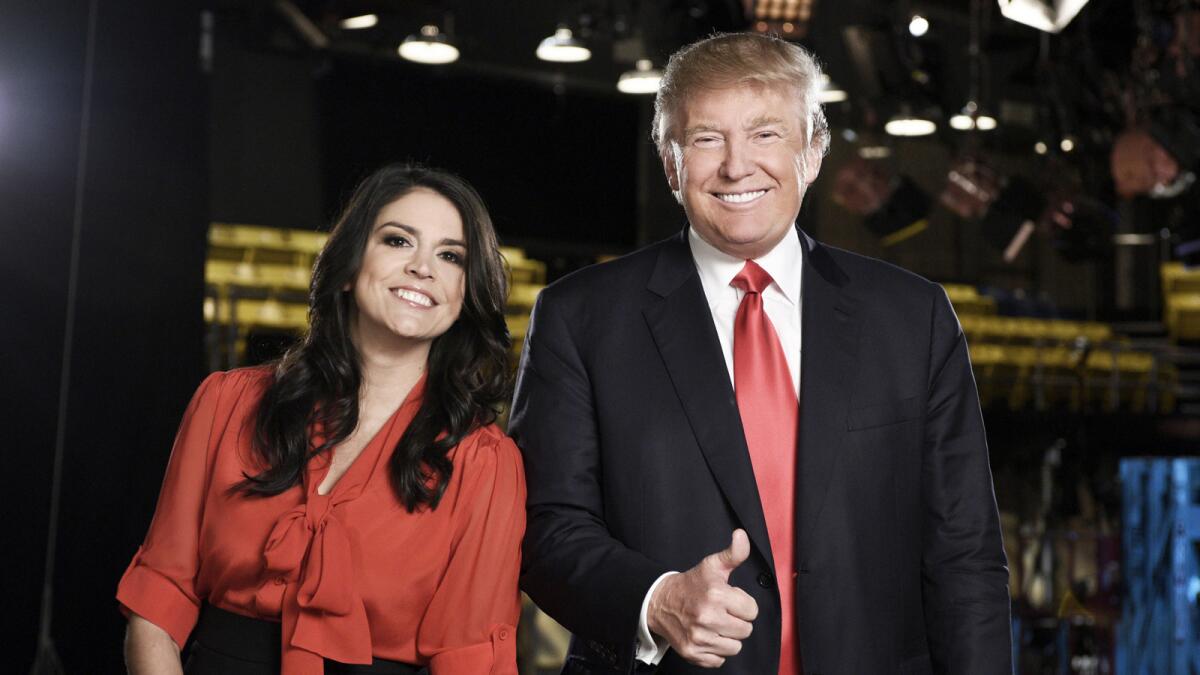
Cecily Strong and Donald Trump on “Saturday Night Live.”
Every presidential candidate is obsessed with polls, but only Donald Trump fixates on ratings. Not approval ratings, television ratings.
“I get the best ratings,” he said recently, appearing to channel NBC executives to explain why he had been asked to host “Saturday Night Live” this weekend.
It’s something Trump says a lot, almost as often as he says “I’m going to build a wall.” In September, he warned that television itself would collapse should he withdraw from the race — no doubt something that he will be saying even more if he continues to lose his lead in the polls.
SIGN UP for the free Indie Focus movies newsletter >>
There is something quaint and almost endearing about Trump’s faith in Nielsen; it may be one of the last great attempts to restore ratings to their former position of glory, and, indeed, empower them further.
But ratings have never been the same as votes — just ask the cast of “Empire” — or even political support, and for all his frequently self-referenced business experience, Trump seems to have missed a major shift in the television industry: Ratings ain’t what they used to be.

Once an easy and instant predictor of success, the television numbers game has become if not outdated then deeply complicated. Judging from the awards bestowed in recent years, ratings have an almost antithetical relationship with voters’ notions of “best” or “outstanding.” A narrow but deeply dedicated group of followers is now deemed as valuable as a large, less passionate audience who may be tuned in more out of curiosity or habit.
Overnight ratings, which is what Trump deals in for the most part, have become less meaningful, and any gains he brings to shows like “Saturday Night Live” are one-time bumps rather than a business model; it’s not as if he were joining the cast (or at least not yet.)
Like the current crop of Republican candidates, television is now too broad and disparate for its traditional measurements, making “success” an increasingly complicated term, gauged as much, if not more, in nuance than numbers.
And Donald Trump has never been big on nuance.
In an odd echo of Stephen Colbert’s creation of a super PAC a few years ago, Trump’s campaign gleefully capitalizes on its own outrageousness. In doing so, it has exposed some queasy truths about American politics. (Including its continued over-dependence on super PACs; one of Trump’s early and strongest draws was his commitment to spending only his own money.)
Once an easy and instant predictor of success, the television numbers game has become if not outdated then deeply complicated.
— Mary McNamara, Los Angeles Times Television Critic
Unlike other candidates who still have “Selling of the American President” jitters about anything that blurs the line between Pennsylvania and Madison avenues, Trump embraces, always has, the salesman’s pitch.
He is the Honey Badger of the race. Like the weirdly impervious animal of YouTube fame — Honey Badger also has a big audience and a signature coif — Trump does what he wants. His biggest strength is his belief in his own indestructibility. Let the bees sting him! He does not care.
Where other candidates spend precious minutes humbling themselves before voters — “This campaign is about you! And what I can do for you?!!” — Trump brashly makes it all about him. That’s his brand, and he is all about his brand.
When New York and then Las Vegas real estate was hot, he waved away any post-Freudian snickers and built big shiny towers, named after himself. When reality television was hot, he didn’t just produce his own show; he starred in it.
Coming from the business rather than the creative side of his many efforts, Trump is far more obsessed with monitoring his coverage than fine-tuning his product. To him, good ratings are far more important than sophisticated ideas about foreign or domestic policy.
Even now, a year away from Election Day, Trump’s vision for his presidency unapologetically begins and ends with him achieving it: If he wins, America wins. Enough said.
In a way, he has filled the gap left by Colbert and Jon Stewart, identifying the real boundaries of American politics by pushing hard against them. The fact that he is not a satirist makes his Honey-Badger-Does-What-He-Wants attitude even more mesmerizing.
Not surprisingly, he has been political click bait from the moment he entered the race. Virtually everything he does is intentionally provocative, and provocative is the currency of social media and everyone attempting to leverage it.
Though television would no doubt endure should he withdraw from the race, the Trump story has certainly fascinated the media; if only because it flouts so many deeply held convictions, about politics, the presidency and, most important, the media themselves.
Certainly Trump, and the vitriol he has prompted from his rivals, was the reason the first Republican debates scored record-breaking ratings. Instead of a forum enlightening voter choices, the early candidate gatherings suddenly became a potential gold mine.
Essentially, it was the free market in action. But after the CNBC debate took the smackdown tone to new levels, many of the Republican candidates grew incensed. Ted Cruz declared “war” on “the liberal media,” NBC and the Republican Party were renounced, and most of the campaigns assembled cabal-like to exert better control over their coverage.
None of which did any of them any favors. Though many viewers sympathized initially, the candidates’ Kremlin-like reaction (and very weird demands) turned what might have been a serious conversation into a joke. Even President Obama could not resist pointing out that people who get flustered on the American soundstage might have a hard time facing off against world leaders.
So while the CNBC debate was the lowest rated of the Republican debates thus far — not surprising considering CNBC’s relatively small audience — it has been the most significant, proof that even for event television, ratings are only a small part of the story.
A year away from Election Day, there are signs that the audience is tiring of Trump’s Honey Badger approach. As with the CNBC debate, the real significance of his appearance on “Saturday Night Live” may be better measured in fallout rather than numbers.
Days before his appearance, hundreds of thousands of Americans angered in particular over comments about Mexicans, demanded that Trump be removed from the show. NBC, which had publicly ended its relationship with Trump in light of those comments, stood accused of hypocrisy and racism.
At the same time, a tin-earred promo for the show, which featured Trump calling rival Ben Carson a loser, was pulled but continued to make the rounds online. (Another, in which Cecily Strong and Sasheer Zamata bat their eyes at “real man” Trump, should reignite questions about gender issues in the “SNL” writers room.)
Even the show’s beloved producer Lorne Michaels has been criticized for pandering; it was Michaels who apparently decided to expand Trump’s role from skit participant to host.
All of which left Trump characteristically unmoved about the protests. “Oh, good. It will get even higher ratings,” he said.
Perhaps. But along with a tutorial on the meaning of television ratings, Trump might need a brief explanation of “hate-watching.”
-------------------
‘Saturday Night Live’
Where: NBC
When: 11:29 p.m. Saturday
Rating: TV-14 (may be unsuitable for children under the age of 14)
ALSO:
Groups say #RacismIsntFunny, urge NBC to dump Trump as ‘SNL’ host
‘Saturday Night Live’ scores high ratings with Hillary Clinton, Miley Cyrus
More to Read
The complete guide to home viewing
Get Screen Gab for everything about the TV shows and streaming movies everyone’s talking about.
You may occasionally receive promotional content from the Los Angeles Times.
